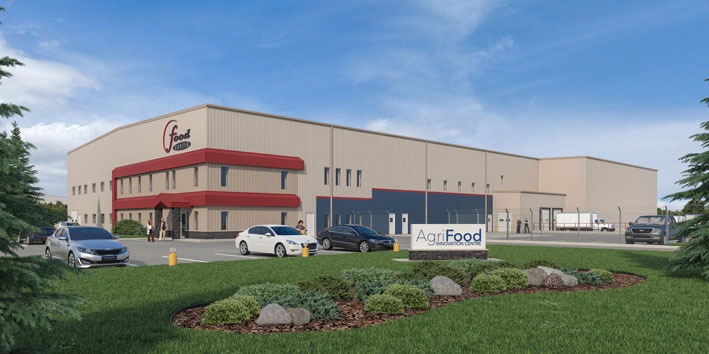Saskatchewan Food Centre’s new facility opens
Since 1997 the Saskatchewan Food Industry Development Centre (Food Centre) has been providing services, technology and facility support to the agri-food processing industry. And now, with many success stories under its belt, the Food Centre has moved into a new 35,000 square foot Agri-Food Innovation Centre.
“The Food Centre is entering a year of change,” says President Dan Prefontaine. “With a list of new technologies, including a dedicated extrusion suite for pulse based innovations, and suites for dry and wet innovation, it’s difficult to pick one new exciting part of the new facility.”
The new facility, located in Saskatoon, is an expansion from the Food Centre’s pilot plant, located on the University of Saskatchewan (U of S) campus, and will help develop and process Saskatchewan food products which can be sold locally and around the world.
“Between the pilot plant and our expansion into the Agri-Food Innovation Centre, the Food Centre provides diverse services to the food industry for market access and proof of concept through pilot processing and incubation,” says Prefontaine.
Supporting Saskatchewan
The Food Centre’s primary goal is to provide expertise and services that foster new product development and market opportunities to the province’s agri-food industry through innovation in processing technologies and training.
“Saskatchewan is Canada’s leader in primary agricultural production. Our new Agri-Food Innovation Centre will strengthen and support the growth of the agri-food sector in commercialization and incubation of products derived from agricultural input,” says Prefontaine.
With a team of more than 30 experts and state-of-the-art technology, the Centre provides support in food and ingredient development, and application; pulse innovation with extrusion; interim processing and incubation facilities; as well as training and food safety education. The larger space means the Centre can expand its services and enable clients to continue to meet consumer demand and capture market opportunities.
“We will be able to offer our clients improved analytical labs, a new mini pilot plant for product and process development, and a commercial incubator for pulse and cereal processing.”
According to Prefontaine, having the space and equipment to conduct enhanced, industry-led scientific research means the Food Centre can increase its capacity to provide the industry with innovative solutions to everyday problems.
“Science is a vital part of the food industry. By expanding our scientific capabilities, we are in a better position to develop solutions in areas such as preservation of important nutrients during processing, reformulation to improve taste, quality and appearance of food products; and allows us to understand how ingredients interact with each other to produce a marketable product,” says Prefontaine.
Other new additions include a commercial kitchen for incidental small-to-medium enterprises and multi-tenant incubation suites for start-ups or market expansion.
Growing an industry
The food industry is constantly adapting to meet high market demands. Currently, healthy is the name of the game.
“At the Food Centre, we can see that innovation and entrepreneurialism in Saskatchewan is growing year after year. We continue to see new food ideas and new products launched into the market by our clients every year,” says Prefontaine. “Our clients are responding to high market demands for plant-based foods, higher fibre content, additional health benefits and healthy versions of comfort foods.”
This kind of demand has provided the Food Centre with opportunities to create partnerships that will help expand the value-added sector and drive commercialization of new agricultural products for both food and non-food uses.
Recently, the Food Centre signed a four-year contract with Verdient Foods, an organic pulse crop processing facility based in Vanscoy and owned by film director James Cameron and his wife, Suzy Amis Cameron. Through this partnership, the Food Centre will be able to develop and identify potential value-added organic food products using ingredients processed at the Verdient Foods plant.
“Plant-based food solutions, from meat alternatives to snacks, are on the rise globally,” says Prefontaine. “Verdient Foods will become the largest organic pea protein fractionation facility in North America, so it’s a huge benefit for Saskatchewan’s pulse industry and Saskatchewan grain farmers.”
The Extrusion Innovation and Development Suites have been operational since October, with other areas of the Agri-Food Innovation Centre slated to be fully functioning by the end of November.
